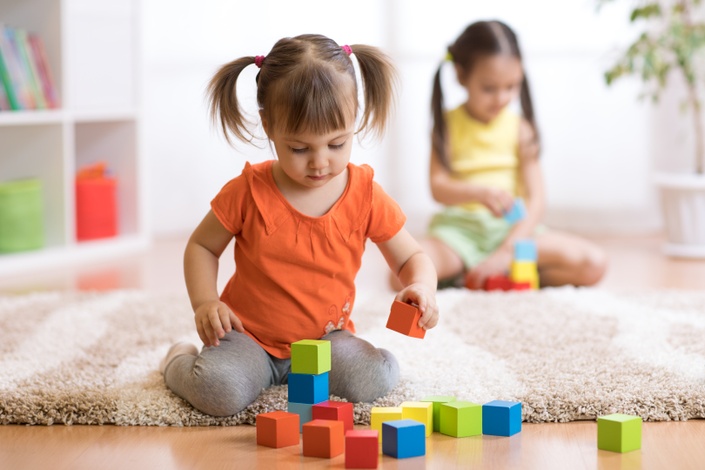Art therapy provides a creative outlet for people to explore complex feelings and emotions through artmaking and the creative process. Unlike traditional talk therapy, art therapy allows the creator to communicate thoughts nonverbally through visual expression in mediums like painting, drawing, sculpture, and collage.
This can be especially helpful for children who may lack the vocabulary to articulate their feelings. The sensory experience of working with art materials can facilitate relaxation and stress relief. The creative process also boosts self-esteem by reminding clients of their strengths and talents.
For those who struggle with painful memories or trauma, the symbolic nature of artmaking allows them to represent these hurts indirectly through colour, shape, and composition. Overall, art and play therapy empowers people to resolve conflict, cope with symptoms, enrich daily life, and deepen self-awareness.
The Healing Power of Play
Child counselling with play therapy uses toys, games, role-playing, storytelling, and other playful activities to help children express thoughts, emotions, desires, fears, and confusion freely. It allows the child to work through challenging issues through self-guided learning and discovery.
As children play naturally and spontaneously, a skilled play therapist offers empathy, respect, and unconditional positive regard to build trust. Play provides a safe space for children to work through traumatic experiences self-directedly by choosing activities and mediums that feel most compelling.
The physical movement involved in play also releases feel-good endorphins that counteract negative feelings. Over time, play patterns tend to shift in a healthy direction as inner conflicts get resolved. It allows the child to transition from unrest to relaxation, joy, and an openness to learning new developmental skills.
Art and Play Support Mental Health
Recent studies validate art and play therapy as evidence-based practices that effectively support mental health. Outcomes show participants build self-esteem, cultivate emotional intelligence, enhance social skills, resolve behaviour issues, and boost academic performance.
Those facing anxiety, depression, trauma, grief, chronic illness, neurodiversity, or developmental delays significantly benefit from creative arts and play. For children on the autism spectrum, art and play therapies build confidence and improve communication, cognition, motor skills and sensory processing.
The American Art Therapy Association highlights how creative modalities help military veterans cope with post-traumatic stress disorder and psychological trauma. Overall, incorporating art and play profoundly impacts health and quality of life across the lifespan.
Benefits for Child Development
The openness of artmaking and play aligns beautifully with the natural learning process in childhood. As children freely explore, experiment, build mastery, collaborate, problem solve, and engage their imagination through creativity and play, it builds a great foundation for positive development. It teaches flexible thinking, enhances physical coordination, and builds cooperative social skills.
Child therapists observe that non-directive, process-focused art and play therapy from the best psychologist consistently helps children:
- Improve focus, self-regulation and stress management
- Work through emotional disturbances and trauma
- Develop healthy attachment and trust
- Cultivate self-awareness, confidence and resilience
- Master age-appropriate developmental tasks
- Strengthen coping strategies and decision-making
This aids healthy growth as children transition through different life stages. It empowers them to face future challenges with an inner strength gained through engaging imagination, embracing self-expression, and learning emotional intelligence through art and play.
Integrative Approach for Best Outcomes
The best psychologist understands that incorporating clinical art and play interventions synergistically enhances outcomes as part of an integrative mental health approach. There is great power in meeting a child client “where they are” developmentally through playful mediums and then building additional layers of talk therapy and other evidence-based treatment methods on this creative foundation.
It is highly adaptable to serving clients across diverse ages, backgrounds and settings. Parents and clinical providers observe immense value in unlocking the healing power of artmaking and guided therapeutic play. It facilitates healthy child development, strengthens family bonds, empowers self-awareness and growth, resolves maladaptive behaviours, and cultivates lasting mental wellness.
Integrating Art and Play Into Daily Life
While child counselling and play therapy offer immense benefits, parents can nurture creativity and playfulness in children’s daily home life. Make art materials available for free expression through drawing, colouring, sculpting with clay, and crafting. Designate areas both indoors and outdoors where kids feel encouraged to play pretend games, build forts, put on performances, and experiment.
Set aside tech-free family play time for board games, musical movement, dramatic play, and storytelling. Building these open-ended creative experiences into regular routines fosters cognitive, emotional, physical and social development. It also strengthens family bonds.
Most importantly, pursue playful creativity purely for fun, wonder and connection. Support children’s natural curiosity to explore materials without pressure to produce some rigid outcome freely. Please reach Dr. Dipti Yadav if you would like to learn more about fostering art, play, and imagination in your family’s daily life.
About Author:
The author is a licensed child psychologist and play therapy specialist with many years of experience. Her integrative practice incorporates art, play, and expressive therapies to foster children’s healthy development, self-awareness, and emotional wellness. She seeks to unlock creative and developmental potential to cultivate lasting resilience, life skills, and family bonds through evidence-based, holistic care.
To know more you can contact us at info@wellbeinghelp.com.


